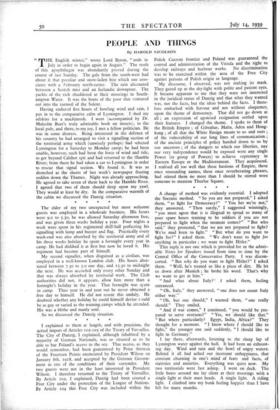I explained to them at length, and with precision, the
actual import of Articles 102-105 of the Treaty of Versailles. The City of Danzig, I explained, although inhabited by a majority of German Nationals, was so situated as to be able to bar Poland's access to the sea. That access, as they would remember, had been guaranteed by Point thirteen of the Fourteen Points enunciated by President Wilson on January 8th, 1918, and accepted by the German Govern- ment as one of the conditions of their surrender. My two guests were not in the least interested in President Wilson. I therefore returned to the Treaty of Versailles. By Article 102, I explained, Danzig had been created a Free City under the protection of the League of Nations. By Article 104 this Free City was included within the Polish Custom frontier and Poland was guaranteed the control and administration of the Vistula and the right to develop railways and harbour works. No discrimination was to be exercised within the area of the Free City against persons of Polish origin or language. My discourse, I observed, was not making its mark. They gazed up at the sky-light with polite and patient eyes. It became apparent to me that they were not interested in the juridical status of Danzig and that what they wanted was, not the facts, but the ideas behind the facts. I there- fore embarked with fervour and not without eloquence, upon the theme of democracy. That did not go down at all ; an expression of agonised resignation settled upon their features. I changed the theme. I spoke to them of the British Empire ; of Gibraltar, Malta, Aden and Hong- kong ; of all that the White Ensign meant to us and ours ; of the vulnerability of our long lines of communication ; of the ancient principles of policy handed down to us by our ancestors ; of the dangers to which our liberties, nay our very independence would be exposed were any single Power (or group of Powers) to achieve supremacy in Eastern Europe or the Mediterranean. They acquiesced. I realised all too well that these bastions of Empire, these once resounding names, these once reverberating phrases, had stirred them no more than I should be stirred were someone to mention Thurloe Square.










































 Previous page
Previous page